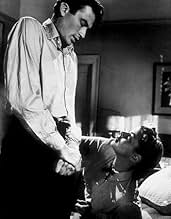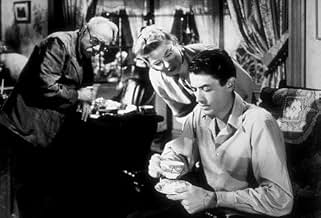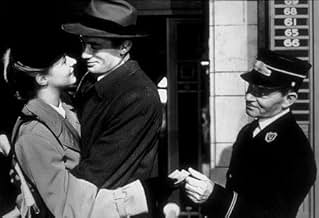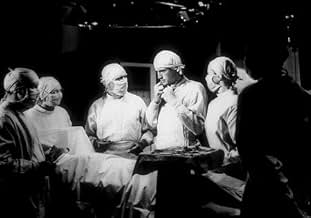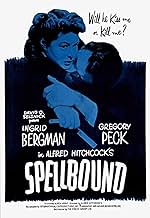AVALIAÇÃO DA IMDb
7,5/10
55 mil
SUA AVALIAÇÃO
Um psiquiatra protege a identidade de um paciente com amnésia acusado de assassinato enquanto tenta recuperar sua memória.Um psiquiatra protege a identidade de um paciente com amnésia acusado de assassinato enquanto tenta recuperar sua memória.Um psiquiatra protege a identidade de um paciente com amnésia acusado de assassinato enquanto tenta recuperar sua memória.
- Direção
- Roteiristas
- Artistas
- Ganhou 1 Oscar
- 8 vitórias e 7 indicações no total
Jean Acker
- Matron
- (não creditado)
Irving Bacon
- Railway Gateman
- (não creditado)
Richard Bartell
- Ticket Taker
- (não creditado)
Harry Brown
- Gateman
- (não creditado)
Resumo
Reviewers say 'Spellbound' is a captivating blend of romance, mystery, and psychological intrigue, showcasing Alfred Hitchcock's signature style. The innovative dream sequences by Salvador Dali are praised for their surreal dimension. Ingrid Bergman and Gregory Peck deliver acclaimed performances, with Bergman as a dedicated psychoanalyst and Peck as an amnesiac suspect. The suspenseful plot, involving a murder mystery and mind exploration, is noted for its twists. However, some find the pacing slow and dialogue melodramatic. The haunting musical score by Miklós Rózsa is celebrated. Despite mixed opinions, 'Spellbound' is regarded as a noteworthy Hitchcock film.
Avaliações em destaque
One of the first films in Hollywood to deal with the subject of psychoanalysis, Alfred Hitchcock's Spellbound is an expertly crafted psychological thriller that works equally well as a brain teaser for its viewers. It tells the story of a psychiatrist who protects the identity of an amnesia patient, disguised as the new head of a mental asylum, and covers her attempts to recover his memory.
Cleverly directed by Alfred Hitchcock, the film is full of twists & turns throughout its runtime and repeatedly plays a dream sequence that toys with viewers' mind like a strong puzzle asking to be solved. Cinematography is a stunning work of film-noir, editing keeps the tension alive from start to finish & thanks to its terrific use of music, it manages to keep the viewers at the age of their seats for the majority of its runtime.
And also worth mentioning are its brilliant performances from Gregory Peck, Michael Chekov & the immensely beautiful Ingrid Bergman amongst whom Bergman impressed me the most for I was completely in awe of her. On an overall scale, Spellbound is a spellbinding tale by the master of suspense that never lets out the entertainment factor for its viewers & keeps them invested in its story with a sense of self-generated curiosity. Highly recommended.
Cleverly directed by Alfred Hitchcock, the film is full of twists & turns throughout its runtime and repeatedly plays a dream sequence that toys with viewers' mind like a strong puzzle asking to be solved. Cinematography is a stunning work of film-noir, editing keeps the tension alive from start to finish & thanks to its terrific use of music, it manages to keep the viewers at the age of their seats for the majority of its runtime.
And also worth mentioning are its brilliant performances from Gregory Peck, Michael Chekov & the immensely beautiful Ingrid Bergman amongst whom Bergman impressed me the most for I was completely in awe of her. On an overall scale, Spellbound is a spellbinding tale by the master of suspense that never lets out the entertainment factor for its viewers & keeps them invested in its story with a sense of self-generated curiosity. Highly recommended.
"Spellbound" is a psychological thriller that tells the story of the new head of a mental asylum (Peck) who turns out to be an imposter. It's love at first sight for Constance (Bergman), a psychiatrist at the asylum, who falls for Anthony (Peck). However, his amnesia and dizzy spells reveal that he isn't the man he says he is, and he may have actually killed the man he's pretending to be.
As things begin to unravel and the situation becomes public knowledge, Anthony does a runner and Constance leaves the asylum to track him down. The pair reunites and Constance quests to prove the innocence of her new lover.
This movie has suspense written all over it. I'm a big fan of Hitchcock movies, especially the cinematography. I love it when the shot cuts to a new location or landscape - almost in complete silence. It gives a certain eerie 'what's going to happen here?' feel to it. Even in the opening titles with the bare tree branches rattling in the wind - you know you're in for a real treat with that spooky music.
At times Peck's character does come across a bit of wimp during his funny 'spells' where he flashes back to a time when he THINKS he may have committed a crime. You want him to pull himself together and snap out of it, yet it's part of the plot so all is forgiven.
When all the signs point to guilt Constance, in what we can only assume is her own delusion and blindness, refuses to believe that Anthony could ever do something so heinous. Her scepticism rings true towards the end when her psychiatric training comes in handy and we discover what really happened. She calls on the expertise of her former mentor, played by Michael Chekhov, who plays the part of the probing, and rather peculiar, psychoanalyst well.
Bergman and Peck make a terrific pairing. The love their characters have for each other is so convincing, you pray (and hope) that Anthony is innocent and it's all a misunderstanding. Bergman portrays Constance's desperation so well - she is desperate to prove Anthony is a good man despite his multiple admissions of guilt.
As things begin to unravel and the situation becomes public knowledge, Anthony does a runner and Constance leaves the asylum to track him down. The pair reunites and Constance quests to prove the innocence of her new lover.
This movie has suspense written all over it. I'm a big fan of Hitchcock movies, especially the cinematography. I love it when the shot cuts to a new location or landscape - almost in complete silence. It gives a certain eerie 'what's going to happen here?' feel to it. Even in the opening titles with the bare tree branches rattling in the wind - you know you're in for a real treat with that spooky music.
At times Peck's character does come across a bit of wimp during his funny 'spells' where he flashes back to a time when he THINKS he may have committed a crime. You want him to pull himself together and snap out of it, yet it's part of the plot so all is forgiven.
When all the signs point to guilt Constance, in what we can only assume is her own delusion and blindness, refuses to believe that Anthony could ever do something so heinous. Her scepticism rings true towards the end when her psychiatric training comes in handy and we discover what really happened. She calls on the expertise of her former mentor, played by Michael Chekhov, who plays the part of the probing, and rather peculiar, psychoanalyst well.
Bergman and Peck make a terrific pairing. The love their characters have for each other is so convincing, you pray (and hope) that Anthony is innocent and it's all a misunderstanding. Bergman portrays Constance's desperation so well - she is desperate to prove Anthony is a good man despite his multiple admissions of guilt.
I recently saw this film on the large screen after having not seen it for over 10 years. My memories of it were not that fond -- I recalled it as an unusually melodramatic and not very convincing thriller enlivened by a very attractive cast.
What I had forgotten about was how almost impossibly silly all the psychoanalytical claptrap is, especially in the first couple of reels, which thereby make us feel very quickly that we're not quite in the mature, masterful grip of Hitch's usual wit and taste. Yes, I know this was made in the 40's, but the first 20 to 30 minutes of the film have more sexist moments and infantile behavior by supposed doctors than one would ever expect from either Hitch or Ben Hecht.
So who's to blame? One guess -- David O. Selznick! That being said (along with the fact that the story doesn't really add up to much of anything, since all the premises on which it's based seem so shaky, naive and downright goofy), the film has some things going for it. About midway through the picture, when Michael Chekhov appears as Dr. Brulov, the film suddenly kicks into what we might call "classic British Hitch mode," with the kind of understated wit and ensemble playing the director had been doing so well since the early 30's. It almost becomes another (and far more palatable) film at this point. The scenes with Bergman, Peck and Chekhov are the highlight of the film, and I have to admit that I'm even kind of fond of the hotel lobby scene, with the appealingly breezy Bill Goodwin (of "Burns and Allen" radio fame) as the house detective. Peck has never been more handsome, in a strangely fragile way.
Also worth a look are the brief but truly unusual Dali-designed dream sequences. There is something to be said for Miklos Rozsa's score as well: although it edges a bit far into soupy overscoring, the expressive main theme has quality, and his use of the theremin (which he also employed in his score for THE LOST WEEKEND at virtually the same time) is striking and represented "something new" in film music.
One could easily make excuses for this film based on "it was only 1945" or "what people knew about psychoanalysis was still naive", etc., but even taken in context of its time it's a pretty silly film without the kind of sustained surety of style leavened with simultaneous suspense, intelligence, taste and humor that he had already proved he could do so well from more than ten years earlier. Given a standard he had already given us with examples from THE 39 STEPS or YOUNG AND INNOCENT through THE LADY VANISHES in the UK, or FOREIGN CORRESPONDENT and SHADOW OF A DOUBT here in the US, this film seems not up to his true capacities, and like his other Selznick-produced American film, REBECCA, seems both overfussy and filled with emphases and spoonfeeding of details which Hitch himself would never have given us.
You need only compare this film with his very next one, NOTORIOUS, to be painfully aware how much better Hitchcock on his own -- using his own standards of pace, momentum and the ADULT treatment of script themes -- could be when not under the thumb of Selznick. Thank God he didn't have to work for him any more after this.
What I had forgotten about was how almost impossibly silly all the psychoanalytical claptrap is, especially in the first couple of reels, which thereby make us feel very quickly that we're not quite in the mature, masterful grip of Hitch's usual wit and taste. Yes, I know this was made in the 40's, but the first 20 to 30 minutes of the film have more sexist moments and infantile behavior by supposed doctors than one would ever expect from either Hitch or Ben Hecht.
So who's to blame? One guess -- David O. Selznick! That being said (along with the fact that the story doesn't really add up to much of anything, since all the premises on which it's based seem so shaky, naive and downright goofy), the film has some things going for it. About midway through the picture, when Michael Chekhov appears as Dr. Brulov, the film suddenly kicks into what we might call "classic British Hitch mode," with the kind of understated wit and ensemble playing the director had been doing so well since the early 30's. It almost becomes another (and far more palatable) film at this point. The scenes with Bergman, Peck and Chekhov are the highlight of the film, and I have to admit that I'm even kind of fond of the hotel lobby scene, with the appealingly breezy Bill Goodwin (of "Burns and Allen" radio fame) as the house detective. Peck has never been more handsome, in a strangely fragile way.
Also worth a look are the brief but truly unusual Dali-designed dream sequences. There is something to be said for Miklos Rozsa's score as well: although it edges a bit far into soupy overscoring, the expressive main theme has quality, and his use of the theremin (which he also employed in his score for THE LOST WEEKEND at virtually the same time) is striking and represented "something new" in film music.
One could easily make excuses for this film based on "it was only 1945" or "what people knew about psychoanalysis was still naive", etc., but even taken in context of its time it's a pretty silly film without the kind of sustained surety of style leavened with simultaneous suspense, intelligence, taste and humor that he had already proved he could do so well from more than ten years earlier. Given a standard he had already given us with examples from THE 39 STEPS or YOUNG AND INNOCENT through THE LADY VANISHES in the UK, or FOREIGN CORRESPONDENT and SHADOW OF A DOUBT here in the US, this film seems not up to his true capacities, and like his other Selznick-produced American film, REBECCA, seems both overfussy and filled with emphases and spoonfeeding of details which Hitch himself would never have given us.
You need only compare this film with his very next one, NOTORIOUS, to be painfully aware how much better Hitchcock on his own -- using his own standards of pace, momentum and the ADULT treatment of script themes -- could be when not under the thumb of Selznick. Thank God he didn't have to work for him any more after this.
Alfred Hitchcock makes his customary quick cameo at 38:52-38:55 at the Empire Hotel lobby in New York City. He's exiting an elevator, smoking a cigarette.
Good Alfred Hitchcock film in which Ingrid Bergman plays a psychiatrist from a mental hospital with various patients (Norman Lloyd, Rhonda Fleming), along with Leo G. Carroll and other doctors heal them . There comes Gregory Peck replacing former director . But Peck has amnesia and having panic to white color and the lines , then Ingrid falls in love with him , as she uncovers his previous life through Freudian analysis . The picture is based on novel ¨House of Edwards¨ by Bleeding and concerning the psychoanalysis , an usual theme in post-WWII time.
The movie contains thriller , tension , suspense , romance , intrigue , unlimited excitement and plenty of plot twists , as usual in Hitchcock films . Besides , it has a literately witty dialog with distinctive Hitch's touches and writing credits by Ben Hetch (Billy Wilder's habitual writer). There's also an exciting and famous dream sequence by Salvador Dali . Hitch didn't want the ordinary dream images with fog and cloud but he asked David O'Selznick (the famed Hollywood producer) for hire to prestigious surrealist painter Salvador Dali from Spain . Superb performances from main characters , a gorgeous blonde (Hitch later used Grace Kelly , Kim Novak) Ingrid Bergman (1915-1982) who would work with Hitchcock in various films (Notorious , Under Capricorn) and the elegant and brilliant Gregory Peck (Paradine trial) as the confuse amnesic , both of whom are frankly well . They are well accompanied by a good support cast , such as : Leo G Carroll, Rhonda Fleming and Norman Lloyd , Hitch' s regular. Sensational black and white cinematography by George Barnes . Dramatic, atmospheric and thrilling musical score by Miklos Rozsa , he won an Academy Award for the excellent score . The flick will appeal to Hitchcock enthusiasts as well as Ingrid Bergman/Gregory Peck fans . Rating : Above average , well worth watching.
The movie contains thriller , tension , suspense , romance , intrigue , unlimited excitement and plenty of plot twists , as usual in Hitchcock films . Besides , it has a literately witty dialog with distinctive Hitch's touches and writing credits by Ben Hetch (Billy Wilder's habitual writer). There's also an exciting and famous dream sequence by Salvador Dali . Hitch didn't want the ordinary dream images with fog and cloud but he asked David O'Selznick (the famed Hollywood producer) for hire to prestigious surrealist painter Salvador Dali from Spain . Superb performances from main characters , a gorgeous blonde (Hitch later used Grace Kelly , Kim Novak) Ingrid Bergman (1915-1982) who would work with Hitchcock in various films (Notorious , Under Capricorn) and the elegant and brilliant Gregory Peck (Paradine trial) as the confuse amnesic , both of whom are frankly well . They are well accompanied by a good support cast , such as : Leo G Carroll, Rhonda Fleming and Norman Lloyd , Hitch' s regular. Sensational black and white cinematography by George Barnes . Dramatic, atmospheric and thrilling musical score by Miklos Rozsa , he won an Academy Award for the excellent score . The flick will appeal to Hitchcock enthusiasts as well as Ingrid Bergman/Gregory Peck fans . Rating : Above average , well worth watching.
Você sabia?
- CuriosidadesSir Alfred Hitchcock was disappointed with the limits of Gregory Peck's facial expressions. According to Peck, "I couldn't produce the facial expressions that Hitch wanted turned on. I didn't have that facility. He already had a preconception of what the expression ought to be on your face, he planned that as carefully as the camera angles. Hitchcock was an outside fellow, and I had the Stanislavski training from the Neighborhood Playhouse, which means you work from the inside."
- Erros de gravaçãoThe burn on J.B.'s hand is only visible when Petersen notices it. It disappears in every other scene where his hand is visible (like when he is sitting on the couch with Dr. Brulov).
- Citações
Dr. Alex Brulov: Women make the best psychoanalysts until they fall in love. After that they make the best patients.
- Cenas durante ou pós-créditosOpening credits: THE FAULT . . . . . IS NOT IN OUR STARS, BUT IN OURSELVES . . . . . - SHAKESPEARE
Our story deals with psychoanalysis, the method by which modern science treats the emotional problems of the sane.
The analyst seeks only to induce the patient to talk about his hidden problems, to open the locked doors of his mind.
Once the complexes that have been disturbing the patient are uncovered and interpreted, the illness and confusion disappear.....and the devils of unreason are driven from the human soul.
- Versões alternativasThe original theatrical version had an Overture and Exit Music by Miklós Rózsa, to a total running time of 118m09s. It was suppressed from distribution until the 1999 restoration based on the negatives of Selznick library (that came to be owned by Walt Disney Company via ABC-TV) and two DVD editions.
Principais escolhas
Faça login para avaliar e ver a lista de recomendações personalizadas
Detalhes
- Data de lançamento
- País de origem
- Idioma
- Também conhecido como
- Cuéntame tu vida
- Locações de filme
- Penn Station, Manhattan, Nova Iorque, Nova Iorque, EUA(establishing shot of the first train station)
- Empresas de produção
- Consulte mais créditos da empresa na IMDbPro
Bilheteria
- Orçamento
- US$ 1.696.377 (estimativa)
- Faturamento bruto mundial
- US$ 19.288
- Tempo de duração1 hora 51 minutos
- Cor
- Proporção
- 1.37 : 1
Contribua para esta página
Sugerir uma alteração ou adicionar conteúdo ausente



